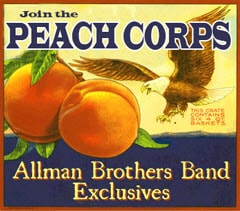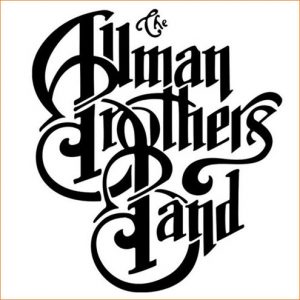By Ed Bumgardner
Winston-Salem Journal
For most young music fans, Oct. 29 is just another day. But for those musicians who grew up Southern, the day marks the anniversary of guitarist Duane Allman’s death – a time for remembrance, for futile speculation and for giving thanks for the music that he made and left behind to remind us of his casual genius.
Sadly, the number of people who remember grows fewer with each passing year. The band that Allman formed, The Allman Brothers Band, has devolved into a bad joke. There are no televised tributes, no candlelight vigils, no thoughtful memorials from music scribes about a fast life snuffed too young and the music left unrealized as a result.
On one hand, that’s a shame, given the breadth of Allman’s influence on popular culture, not to mention his innovations as a slide guitarist and a musical visionary.
On the other hand, Allman was not one for star trips or the spotlight. He was, in some ways, a paradox. He was incredibly charismatic – a beanpole with a cascade of reddish-blonde hair and a huge walrus mustache – but he loathed having his picture taken any place other than onstage or in the recording studio.
He was a gentle soul with a commanding personality. He would snarl at hapless photographers that “he didn’t pose for any (expletive) pictures.”
He did not suffer fools. Any journalist who could not talk intelligently about music, who did not come to interview him with a full understanding of the band and its music, would take a beating.
Allman had music to make. He couldn’t be bothered with having his time wasted.
From his perspective, he and his band, The Allman Brothers Band – and it was his band – were not involved in showbiz.
He worked for a living. Making music was work. It was all that mattered. To that end, the band, which was formed in 1969 and peaked in 1971, continuously made music in its early years.
The Allmans toured relentlessly, performing epic shows that showcased the band’s daunting improvisation without ever seeming gratuitous or repetitive in nature. Such was the intensity, the almost telepathic musical interplay, inherent in an Allman Brothers performance.
Allman called a good night of playing “hittin’ the note.”
During his lifetime, the Allman Brothers Band hit far more than it missed.
The importance of Allman’s legacy cannot be stressed enough.
He created a musical platform for young musicians in the South. Before his arrival in the mid-1960s – his blossoming talent is best appreciated on the many R&B sessions he worked on at Fame Studio in Muscle Shoals, Ala. – there were no successful rock bands from the South.
Aspiring Southern rock musicians either had to leave for New York or Los Angeles, or they had to try to back the touring R&B stars of the day.
“For Southern musicians at the time, Duane was almost a religious figure,” said Phil Walden, Allman’s former manager and the president of Capricorn Records, for which Allman recorded.
“He appeared out of nowhere. He was preaching a new way of making music. He liberated literally thousands of musicians. He made it hip to make music in the South.
“He set a standard of musical excellence. The influence he had was huge, not just on guitarists – which was enormous – but on all musicians.”
Allman’s first claim to fame was his blazing (by the standards of the time) solo during the prolonged coda of Wilson Pickett’s version of “Hey Jude” by The Beatles.
It was Allman’s first session at Muscle Shoals. He walked in, took command and forced a recalcitrant Pickett into doing the song. He left the musicians, all seasoned, gape-mouthed.
An amazed Pickett nicknamed Allman “Skyman,” in tribute to his high-flying solo.
“Duane was not prone to hanging around in the corner,” said David Hood, the bassist for the Muscle Shoals Rhythm Section, during an interview in 2000. “When he walked into the room, everything changed. He played with incredible intensity.”
Hood, who worked with Allman on sessions for Aretha Franklin and Boz Scaggs, among others, gave a laugh at the memory of his late friend.
“You’ve got to remember, there were no hippies in Alabama in the late 1960s. Duane would ride around town on his motorcycle, wearing these wild clothes, his long hair flowing, and the people in town would just stop and stare. It was like he was from Mars, or something.”
The original Allmans – Duane, younger brother Gregg, the late Berry Oakley, Dickey Betts, Jaimoe Johnson and Butch Trucks – created a musical voice singular to rock music.
It was highly improvisational, deeply rooted in blues, with pronounced arms that spread into jazz and rock. Songs were never played the same way twice; musical ideas formulated within improvisation would be fleshed out in subsequent performances until they became part of the song.
“I heard Duane play on many occasions,” said Jerry Wexler, the great producer and record mogul, during a 1998 interview. “I never heard him have an off night. He played with precision and grace. As a player, and as a human being, he was fearless.
“He lived to play. Music and wisdom poured from him.”
Allman died Oct. 29, 1971, in a motorcycle accident.
So on Tuesday, take time and listen to Allman on album. Savor the diversity of his playing heard on the two compilations of his studio work -Duane Allman: An Anthology, Vols. I and II.
Lend an ear to his spectacular contributions to Layla & Other Assorted Love Songs, the masterpiece he recorded with guitarist Eric Clapton and Derek and the Dominoes.
Listen to any of the four discs he recorded with the Allmans, most notably the seminal At Fillmore East.
Absorb the force and invention of Allman’s playing. Marvel at how his work still sounds fresh, urgent and vital.
Three months after At Fillmore East broke the Allman Brothers into the mainstream, Allman was dead.
He never lived to reap the monetary rewards of his work. He had less than $3,000 to his name when he died.
He was 24, still a baby, but so mature, so gifted, so accomplished.
All Southern musicians should take time to say thank you; know it or not, Allman opened the door for them to play, whatever kind of music they make.
Then, as Allman used to say upon leaving, “Eat a peach for peace.”
It can’t hurt.
• Ed Bumgardner can be reached at 727-7284 or at ebumgardner@wsjournal.com



